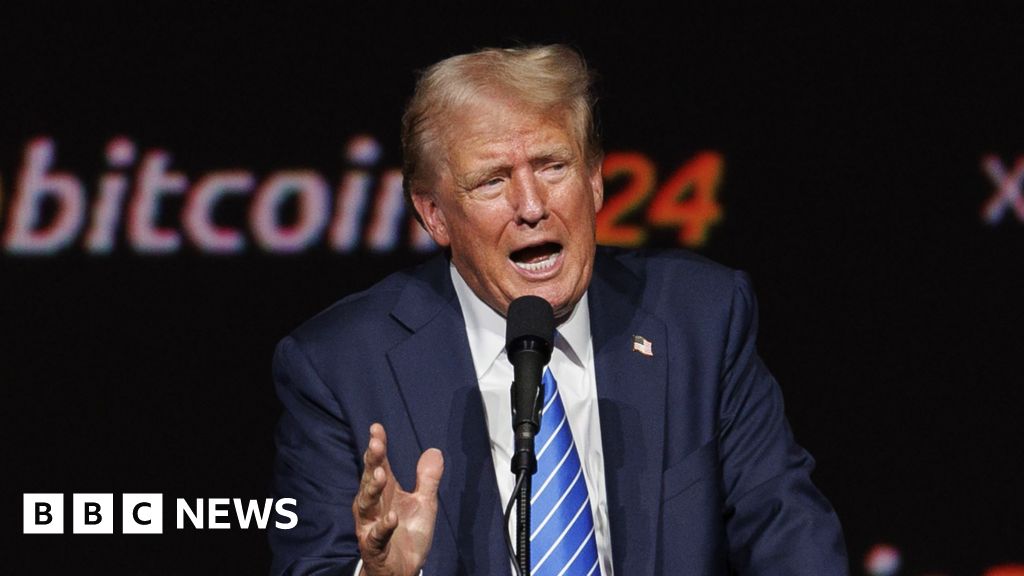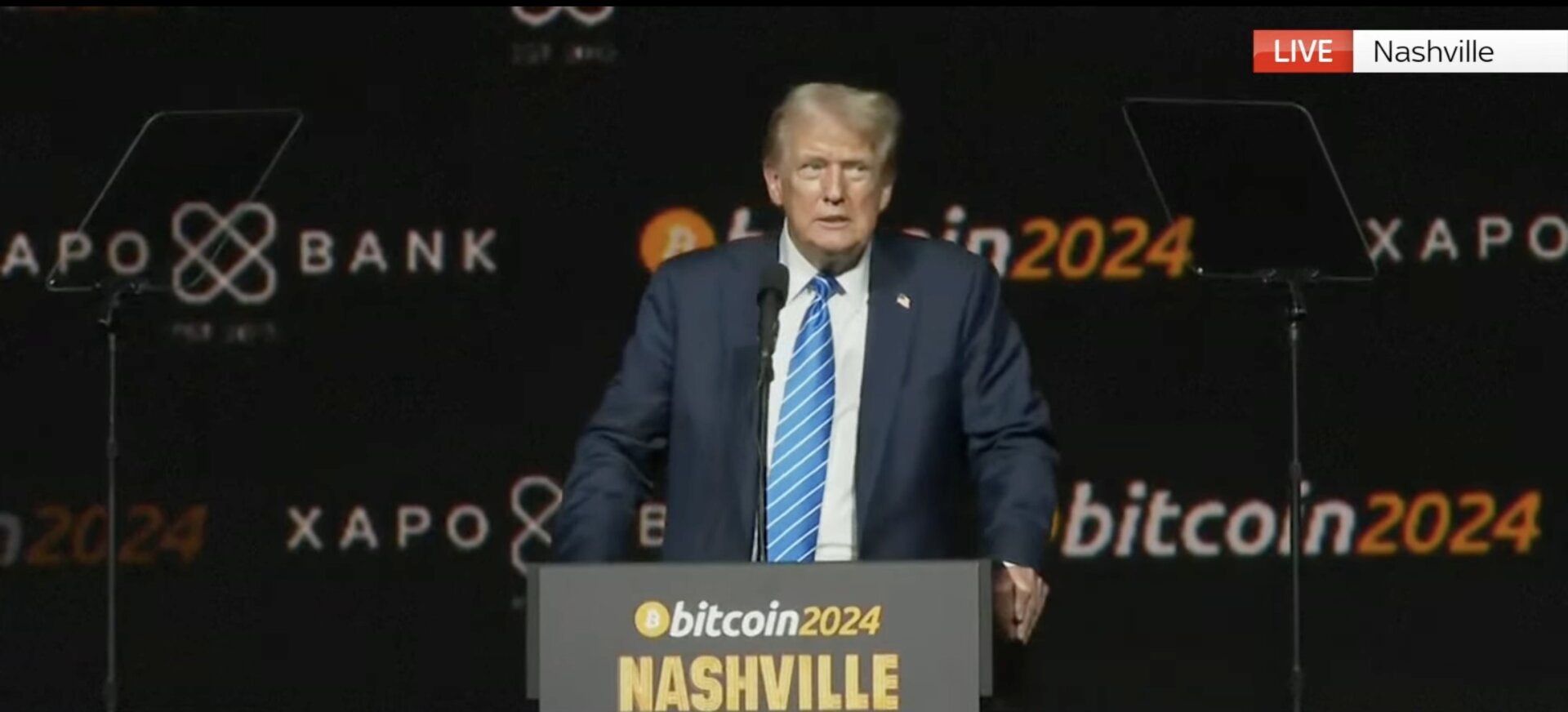Tech
The Latest Tech News in Crypto and Blockchain

March 13 (PROTOCOL VILLAGE EXCLUSIVE): Fjord Foundry, a token-sale platform, has raised $4.3 million in a seed round led by Lemniscap, with participation from Mechanism Cap, Zee Prime Cap, Castle Capital and various renowned angels, according to the team: “Fjord offers a host of token sale methods, including its Liquidity Bootstrapping Pools (LBPs), which prioritize equitable distribution, mitigating the risk of whale manipulation and bots. The round comes as Fjord is preparing to announce all-inclusive chain aggregation and the upcoming launch of its native utility token FJO.”
Avail’s Arjun Joins Layer-1 Ternoa as Strategic Advisor
March 13: Anurag Arjun, a Polygon co-founder who now leads the data-availability project Avail, has joined Ternoa as a strategic advisor, according to the team: “Ternoa has been a Layer 1 blockchain and TEE coprocessor infrastructure provider in the mainnet since 2022 and will launch a zkEVM layer-2 validium. As an advisor, Anurag will provide strategic counsel to Ternoa’s leadership team, offering insights and recommendations to drive the company’s growth and success and navigate Ethereum’s layer-2 ecosystem.
Sovryn, Bitcoin DeFi Platform, Expands to BOB, a Bitcoin/Ethereum ‘Hybrid L2’
March 13: Sovryn, a Bitcoin DeFi platform with $136 million of total value locked (TVL), is “expanding to BOB, a Bitcoin and Ethereum hybrid layer 2 that offers unparalleled security and access to deep liquidity by integrating with both ecosystems,” according to the team: “This partnership aims to channel Ethereum’s liquidity into Bitcoin DeFi and convert Ethereum users into Bitcoin adopters. Sovryn will deploy its DeFi suite on BOB, including Sovryn Dex 2.0 with lower gas fees and faster transactions than Uniswap. Launch is timed around the Bitcoin halving, signaling the start of a ‘Bitcoin summer’ amid rising interest for Bitcoin DeFi and L2s.”
Injective Integrates With Noble to Add USDC
March 13: Injective today announced its integration with Noble, native issuer of USDC within the Injective blockchain ecosystem, to add the stablecoin. According to the team: “Users now have direct access to native USDC – accessing its substantial $30.4 billion market cap – through a diverse set of Injective ecosystem dApps (e.g., Helix). This integration facilitates improved user experiences where TradFi offerings can be deployed in DeFi environments.” (INJ)
Ethereum Staking Protocol Swell Unveils Layer-2 Rollup With $1B Total Value Locked
March 13: Ethereum staking protocol Swell has introduced a layer-2 rollup with $1 billion in total value locked (TVL) using Polygon’s chain development kit (CDK). Swell developed the rollup alongside Ethereum scaler AltLayer and a16z-backed crypto staking project EigenLayer. A layer 2 is a protocol designed to scale a blockchain’s capacity by executing transactions off-chain and packaging them together for submission to the main network. The rollup will take the form of a “restaked rollup,” which comes with a range of services such as decentralized sequencing, verification and faster finality, Swell said on Wednesday.
Movement Integrates Aptos’s Data Availability Capabilities
March 13: Movement is integrating Aptos’s Data Availability (DA) capabilities with the Move Stack and establishing sophisticated routing infrastructure between Movement, an Ethereum Virtual Machine (EVM) blockchain and Aptos (a non-EVM) blockchain, according to the team: “Collaboration between Aptos Foundation and Movement will enable applications, networks and frameworks on Movement to seamlessly interact with the Aptos blockchain, marking a significant milestone towards a more interconnected and efficient global blockchain ecosystem.”
Pyth Introduces ‘Pyth Entropy’ as Random Number Generator
March 13: Pyth Network, a data oracle, introduced “Pyth Entropy” as a random number generator (RNG) for blockchain apps, according to the team: “Trustless RNG is critical for Web3 applications designed to deliver unpredictable outcomes across gaming, NFTs, lotteries, betting markets and more. Developers on Arbitrum, Blast, Chiliz Chain, Fantom, LightLink, Optimism are the first to have access to Entropy on their native mainnet environments.”
PropyKeys Announces DApp for Minting Digital Addresses for Tangible Properties
March 13: PropyKeys, a project within the Propy ecosystem known for its blockchain-powered real estate solutions, announced the public launch of their decentralized application (dApp), which enables users to mint a digital address corresponding to a tangible property, according to the team: “Deployed on Base, Coinbase’s layer-2 network, and powered by the PRO token, users can mint digital versions of any home addresses or global landmarks. Furthering Propy’s mission to democratize real estate ownership, PropyKeys is creating a home addresses platform and property deed storage on the blockchain.
SendingNetwork Launches Bandwidth Mining Testnet
March 13: SendingNetwork, communication infrastructure for Web3, launches its bandwidth mining testnet. This initiative is set to transform the digital communication space by leveraging underused bandwidth to create a decentralized, secure and efficient network.
Vega Protocol Launches ‘Points’ Futures, Starting With Market on EigenLayer
March 13: Vega Protocol, a purpose-built blockchain for decentralized derivatives trading, is launching the first futures markets for “points,” according to the team. The first markets are for EigenLayer points, with more expected soon. Vega’s permissionless points markets work by allowing anyone to propose the creation of derivatives markets for points. The community defines the market parameters, including the settlement methodology. Vega uses UMA’s Optimistic Oracle to resolve each points market at the time of the “Airdrop Event,” which triggers settlement and determines the price per point. Users can assert claims to the oracle, which are verified on-chain if undisputed. This decentralized framework enables complex market rulesets without relying on a single centralized custodian.
ClearToken Raises $10M From Institutional Investors Including Nomura’s Laser Digital
March 13: Cleartoken, a cryptocurrency clearing house, has received over $10 million in seed investment from institutional investors, the company said Wednesday. Investment came from firms including Laser Digital, the digital assets subsidiary of Nomura, liquidity providers including Flow Traders and GSR and from digital asset companies LMAX Digital and Zodia Custody.
On-Chain Game DEAR Using ARPA’s On-Chain Random Number Generator
March 13: DEAR, the first fully on-chain game inbubated by ARPA Network, is now live on Redstone Holesky, according to the team: “DEAR utilizes Randcast, ARPA Network’s on-chain, verifiable random number generator (RNG), designed with a comprehensive suite of APIs to support Fully On-Chain Games (FOCG) and Autonomous Worlds. Randcast offers a cryptographically generated random source with superior security and low cost compared to other solutions. Metaverse, game, lottery, NFT minting and whitelisting, key generation, and blockchain validator task distribution can benefit from Randcast’s tamper-proof randomness.”
Protocol Village is a regular feature of The Protocol, our weekly newsletter exploring the tech behind crypto, one block at a time. Sign up here to get it in your inbox every Wednesday. Project teams can submit updates here. For previous versions of Protocol Village, please go here. Also please check out our weekly The Protocol podcast.
Elixir, Decentralized Network for Orderbook Exchanges, Raises $8M
March 12: Elixir, a decentralized network that improves liquidity across orderbook exchanges, completed an $8 million Series B funding round, “bringing the project’s valuation to $800 million,” according to the team: “Mysten Labs and Maelstrom co-led the round, which also included participation from Manifold, Arthur Hayes, Amber Group, GSR, Flowdesk, Validation Cloud and others. Elixir allows users to supply liquidity to pairs on orderbook exchanges while earning rewards, including on Vertex, Bluefin and RabbitX – and soon dYdX, ApeX, Hyperliquid, Orderly, NFTPerp and more.”
RSS3, Decentralized Information Layer, Launches Mainnet Alpha
March 12: RSS3, a decentralized network designed to promote the free flow of information on the open web, said its Mainnet Alpha was set to go live on March 11 at 6 p.m. Pacific time (1 a.m. UTC on March 12). According to the team: “Inspired by the original RSS protocol, RSS3 is aiming to enhance information freedom through decentralization. The unique Mainnet design consists of 3 parts: indexing nodes, structuring open data and a layer 2 focusing on AI and information. RSS3 nodes will be equipped with the capability to cover specific data sources, create search engines, and build local-first open AI models.”
Schematic of RSS3 “data sublayer,” from the project’s whitepaper (RSS3)
NibiruChain, Layer-1 Chain, Launches Mainnet, Claiming Capability of 40K TPS
March 12: NibiruChain, a layer-1 blockchain built by founders from Google, Tendermint, IBM and Sommelier, is announcing the launch of its public mainnet, according to the team: “Nibiru aims to address users’ onboarding challenges and provide a fully mainstream decentralized multichain solution. It is capable of processing 40,000 TPS with instant finality, made possible through parallel optimistic execution. Nibiru reduces the complexities associated with L2s by offering proven interoperability with other L1s, a fully sovereign network and increased developer infrastructure of its own.” Smart contracts on Nibiru are written in Rust CosmWasm, which runs in the WebAssembly runtime, according to the project’s documentation.
Bluwhale, AI Platform to Connect Companies to Web3 Wallet Holders, Raises $7M
March 12: Bluwhale, a San Francisco-based AI-powered platform designed to connect companies with Web3 wallet holders, disclosed that it raised $7 million in seed funding. SBI led the round and was joined by Cardano, Momentum6, Primal Capital, NxGen, Ghaf Capital Partners, Spyre Capital, Baselayer Capital and others.
Goldman Sachs, BNY Mellon and Others Test Enterprise Blockchain for Tokenized Assets
March 12: Bluechip financial blockchain provider Digital Asset has completed a test of its so-called Canton Network, with the participation of financial heavyweights like Goldman Sachs, BNY Mellon, DRW, Oliver Wyman,and Paxos. The Canton pilot, which involved 15 asset managers, 13 banks, four custodians and three exchanges, allowed the firms to seamlessly transact and settle tokenized assets and deal with fund registry, digital cash, repo, securities lending, and margin management transactions, according to a press release on Tuesday.
Studio369, Gaming Studio in Production With Web3 Publisher Immutable Games, Raises $5M
March 12: Studio369, the game development company behind the upcoming blockchain-powered multiplayer PvP-focused shooter MetalCore, announced the raise of $5 million via a new funding round with participation from BITKRAFT Ventures, Delphi Digital, Sanctor Capital, Spartan Group and other investors.
Solana-Based Solend Expands to Sui, in Search of ‘Better Developer Tools’
March 11: The team behind Solana-based lending protocol Solend has launched Suilend on the Sui Mainnet, marking the team’s first venture outside of the Solana ecosystem: “Solend, which boasts over $200 million in TVL across 170,000+ users with support for 70+ assets, brings its unparalleled DeFi expertise and experience building industry-leading lending protocols to the Sui ecosystem, adding to the quickly expanding depth of the network.” Rooter, Solend’s pseudonymous founder, said in a comment emailed by the Sui team: “Developing on Ethereum and Solana felt like building a cathedral with chisels and hammers. That’s not to say you can’t build great things; cathedrals are some of the most beautiful human achievements. But we want to build rocket ships, and for that, you need advanced tools like laser cutters and welders. That’s what Sui and Move offer with better developer tools.”
Bitcoin Restaking Protocol BounceBit Launches Testnet
March 11: BounceBit, a Bitcoin restaking infrastructure protocol, launched its testnet on March 8, “offering the opportunity to users to experience a dual-token staking PoS Layer 1, which uses BTC as well as the native BounceBit token to secure the network with liquid staking,” according to the team: “BounceClub, a no-code solution for on-chain development, will go live on BounceBit as testnet event. Users who participate in Early Access will be given a free BounceClub. Mainnet is set to launch late April, at the Bitcoin halving.” CoinDesk 20 asset: (BTC)
NFTfi, Peer-to-Peer Lending Protocol for NFTs, Raises $6M in Series A1 Round
March 11: NFTfi, a peer-to-peer, decentralized lending protocol for loans collateralized with NFTs, has raised $6M in a Series A1 fundraising, led by Placeholder VC, bringing total funding to $15M, according to the team: “Notable co-investors include Maven 11, Launch Labs Inc, Kahuna Ventures. Launched in 2020, NFTfi pioneers NFT Finance, facilitating significant on-chain loans. Future plans include enhancing dApp features, expanding SDK capabilities, and creating an open settlement layer for NFT finance. NFTfi allows NFT holders to borrow ETH, USDC or DAI from lenders using their NFTs as collateral, in a trustless P2P manner.”
Rarimo Community Reveals ‘Russia2024’ as Use Case for Survelliance-Free Polling Tool
March 11: Members of the Rarimo community, a digital identity protocol, revealed that “Russia2024 is the first use case of the recently launched Freedom Tool, an open-source solution for citizen-run, surveillance-free elections and polling.” According to the team: “Russia2024 is an encrypted polling app allowing dissenting Russian citizens to sign petitions, vote in polls and participate in protest elections without being traced. As a Freedom Tool application, Russia2024 uses zero-knowledge cryptography servers to ensure the safety and anonymity of its users, and votes are published directly onto the blockchain where they are tamper-proof. It was announced by opposition activist Mark Fegyin.”
With Mastercard, MetaMask Tests First Blockchain-Powered Payment Card
Blockchain Builder Eclipse Labs Raises $50M Ahead of Layer-2’s Mainnet Debut
March 11: Eclipse Labs, the company building a blockchain to scale Ethereum using parts from Solana, raised $50 million ahead of its mainnet debut, which should come within weeks. According to the story by CoinDesk’s Danny Nelson: “Eclipse seeks to use a mix of technology from Solana, Celestia, Ethereum and RISC Zero for its proposed scaling solution – basically, speed like Solana with security provided by Ethereum. Apps built for Solana will be able to run on Eclipse with minimal changes, with SOL being the token of the realm.”
StargateDAO Votes to Remove Daily Limits on Aptos Bridge on LayerZero
March 11: Aptos Foundation, LayerZero, and Stargate are expanding their integration to remove transaction limits and publish educational resources that help users navigate DeFi on Aptos while benefiting from interoperability, according to the team: “Stargate’s Aptos Bridge, built directly on the LayerZero protocol, facilitates seamless asset transfers between Aptos and other chains, allowing builders and users to bridge tokens and use assets across blockchains. StargateDAO has elected to remove the daily transaction limit on the Aptos Bridge, allowing for unrestricted activity and enhanced scalability for builders using the bridge.” {{APTOS}}
Location-Based NFT Platform Lost Worlds Launches ‘Creation Portal’ for ‘GeoNFT’ Minting
March 11: Lost Worlds, a project for location-based NFTs, has launched “Creation Portal” to enable simplified “geoNFT” minting. The portal is designed to integrate digital assets with real-world places by simplifying the process for users to mint geoNFTs. “Previously, creating and deploying geoNFTs required direct coordination with the Lost Worlds team. The Creation Portal changes this, opening the doors to anyone – from individual enthusiasts to large-scale projects – interested in crafting and exploring geoNFTs across any supported blockchain,” according to a press release. The project is supported by Ava Labs and Polygon, according to the team.
Pi Network to Require Ad Buyers on Browser, Apps to Pay in PI Tokens
March 11: Pi Network, a utilities-based ecosystem for third-party apps on a mobile web platform, said in a message from the team that “after the Open Network period is launched, advertisers or parties that want to place ads on Pi Browser and Pi Apps in the Pi Ecosystem will have to acquire PI and use such PI to pay the Pi platform for displaying ads. PI will, in turn, be distributed to the developers of Pi Apps displaying ads on the platform. In this way, the ad network will generate additional platform-level utility for PI, and thus, benefit the whole network.” An explanation of the design and benefits is in the announcement.
Arbitrum Orbit Layer 3s Now Available on Coinbase Layer-2 Base
March 8: Coinbase’s head of protocols, Jesse Pollak, tweeted that it’s now possible to “build Arbitrum Orbit L3s on Base,” which is the U.S. crypto exchange’s layer-2 network atop Ethereum.” (ARB)
S3 Launches as ‘Stablecoin Studio’ on Sui Blockchain
March 8: S3, described as a “stablecoin studio,” launched on the layer-1 Sui blockchain, marking a key network functionality upgrade. According to the team: “S3, powered by Cairo-based blockchain startup Pravica, provides builders on the Sui blockchain with the opportunity to seamlessly launch native stablecoins without the complexities of smart contract development and currency management. S3 simplifies the process for existing stablecoin issuers, such as USDC and USDT, to integrate with Sui, and also facilitates the creation of bespoke stablecoin solutions tailored to meet specific regulatory requirements in various jurisdictions.”
GoPlus Security, Web3 User Security Network, Raises $4M
March 8: GoPlus Security, a leading Web3 user security network, successfully concluded its Series II+ funding round with $4 million, according to the team: “This latest round brings the project’s cumulative fundraising total to $15 million, including funds raised in a private round led by Binance Labs with contributions from Redpoint China Ventures, Avalanche and others. GoPlus is reshaping Web3 security, offering transparent access and introducing a new platform ‘SecWareX’ to empower users. Their aim is to emerge as the foremost provider of User Security Modules as a Service across various blockchains.”
Celo Integrates Rarible’s API Solution
March 8: Celo Foundation and Rarible announced the integration of Rarible’s new API solution on the Celo blockchain, designed for fast, low-cost payments, according to the team: “Through the integration, creators and developers building on Celo can leverage a robust toolkit of solutions for their decentralized applications (dApps) which include: Real-time NFT indexer, aggregated order book, multi-chain support, powerful trading SDK.”
RepubliK, Blockchain-Enabled System for Rewarding Artists, Launches AI-Powered ‘SocialFi’ Platform
March 8: RepubliK, a blockchain-enabled platform for rewarding artists and creators, is launching a new AI-powered SocialFi platform on March 8, according to a press release: “Teaming up with AWS AI and ML, it plans to change how content is assessed and user interactions are analyzed. Instead of just popularity, the platform focuses on quality interactions with the help of AI. It’s also making its technology better with a layer-2 solution and multi-chain approach, which will help transactions run smoother and support more people.”
Dfinity Releases ‘DocuTrack’ for Sending Encrypted Documents
March 7: The DFINITY Foundation, supporting the Internet Computer blockchain, announced the open alpha release of DocuTrack, “an open source decentralized application developed in collaboration with a Swiss private bank to enable secure encrypted document transfer between enterprises and their clients on-chain,” according to the team: “DocuTrack enables registered and unregistered users to securely transfer sensitive documents like applications, property deeds and identity certificates in an encrypted format.” (ICP)
Cryptography Firm Zama Raises $73M for ‘Fully Homomorphic Encryption’ Apps
March 7: Open-source cryptography firm Zama has raised $73 million in Series A funding to develop applications based on fully homomorphic encryption (FHE), a technology that enables data to be processed without decrypting it – potentially useful for protecting privacy in blockchain and AI. The funding round was led by Multicoin Capital and Protocol Labs, Zama announced via email on Thursday. Participating investors included Solana co-founder Anatoly Yakovenko, Filecoin founder Juan Benet and Ethereum and Polkadot co-founder Gavin Wood, according to a press release.
Rand Hindi, CEO of Zama (Zama)
Sonarverse, Provider of Datasets on Blockchains, Raises $7M in Seed Round
March 7: Sonarverse, which according to its website offers “curated, reliable datasets for over 32 chains by leveraging Snowflake technology,” has raised $7 million in a seed funding round, led by BlockTower Capital with participation from United Overseas Bank, Aglaé Ventures, Third Prime Ventures, Ocular Funds, Aptos, FBG and FJ Labs. According to the team: “Obtaining comprehensive, high-quality blockchain data is challenging, yielding incomplete data often riddled with quality issues without extensive infrastructure. Sonarverse resolves this pain point with powerful multi-chain data solutions capturing the ecosystem’s complete story – 3X+ more chains w/ plans to be into the 100s of chains this year and rapidly cover new chains as clients demand.”
Virtual Phone App ‘APhone’ Launches Via Solana
March 7: APhone, a device-agnostic web-based virtual phone app, announced its official launch via the Solana ecosystem, according to a press release: “APhone NFTs, which give users access to the in-app experience, can be minted and activated (burned) directly on the Solana chain. As an affordable DePIN-powered virtual mobile phone app, charging $20 per year, APhone bypasses the hardware limitations of older phone models and enables access to Solana’s strong DePIN ecosystem, where GPU, storage, and RAM are essential for seamless functionality.”
Burnt Banksy Launches XION Blockchain, With USDC as Primary Currency
March 7: Burnt Banksy announced the launch of XION’s mainnet, “the first blockchain purpose-built for mainstream adoption and the first to use USDC, a fully-reserved digital dollar, as its primary transactional currency,” according to the team: “The announcement was made as part of Burnt’s exclusive performance in New York, during which the founder lit himself on fire and subsequently set XION aflame, symbolizing a new light for the crypto industry.”
Image shared by a rep of Burnt Banksy’s performance at XION blockchain launch in Brooklyn on Wednesday. (Burnt Banksy)
Blackwing, Developer of Modular Layer-2 Chain for Trading, Raises $4.5M
March 7: New York-based Blackwing, founded by ex-Meta and Robinhood vets, raised $4.5 million, led by Hashed VC and gumi Cryptos Capital, according to the team: “Blackwing developed the first modular layer 2 blockchain designed for liquidation-free leveraged trading. The blockchain uses ‘Limitless Pools’ that enable users to trade with borrowed funds without facing forced liquidations, ensuring liquidity providers benefit from earning more fees, and traders benefit from safer leverage.”
Core Foundation Announces $5M ‘Innovation Fund’ Focused on India
March 7: Core Foundation announced a $5 million Innovation Fund to advance India’s decentralized application ecosystem on Core Chain, a Bitcoin-secured and EVM-compatible blockchain, according to the team: “This fund aims to empower Web3 communities, enhance education, and provide vital support to founders and builders throughout India.” According to its project documentation, Core Chain runs on a consensus mechanism known as “Satoshi Plus that unites Delegated Proof of Work (DPoW) and Delegated Proof of Stake (DPoS).”
Web3 Messaging Platform Beoble Gets Strategic Investment From Animoca
March 7: Beoble, a Web3 messaging platform, has received strategic investment from Animoca Brands, according to the team: “This investment will be used by beoble to enhance user interaction, privacy and security through blockchain technology, as well as expand advanced Web3 chat features to selected companies within Animoca Brands’ portfolio. The new funding will be used to accelerate the platform’s development and expand its features, offering greater interoperability to its user base globally.”
DeFi Aggregator Hashflow Launches on Arbitrum
March 7: Hashflow, a leading decentralized finance (DeFi) trading platform, today announced the launch of its Arbitrum-native aggregator, creating a hub for all Arbitrum ecosystem traders, according to the team: “Through its intent-based, Smart Order Routing architecture, Hashflow’s new product, Aggregator+, enables traders to tap into roughly $8B of liquidity to get the best prices on the most popular tokens on Arbitrum. As the Arbitrum DeFi community continues to expand rapidly, Hashflow is positioning itself as a one-stop trading platform for all users in the ecosystem.” (ARB)
Wert, Web3 Facilitator of Fiat Payments, Broadens Card Acceptance to JCB, Amex, Discover
March 7: Wert, a payment solution provider facilitating fiat payments in the Web3 space, is set to broaden its card acceptance to JCB, American Express (Amex) and Discover cards in collaboration with Worldpay, a global payment processor, according to the team: “This promotes broader engagement from non-crypto native users and nurtures inclusivity in the Web3 space. Now, Wert will support cards for holders in a staggering 198 countries, giving seamless access to web3 for the estimated 121M Amex, 140M JCB and the roughly 57M Discover cardholders.”
Tech
The Information Hires Peterson to Cover Tech, Finance, Cryptocurrency

My life is nice
Tech news site The Information has hired Business Insider actress to cover technology, finance and cryptocurrencies.
She was part of Business Insider’s investigative team. She was also previously a corporate technology reporter and a technology deals reporter.
Peterson has been with Business Insider since June 2017 and is based in the San Francisco office.
She previously worked for Folio as an associate editor. She holds a bachelor’s degree from the University of California-Davis and a master’s degree from New York University.
Chris Roush
Chris Roush is the former dean of the School of Communications at Quinnipiac University in Hamden, Connecticut. Previously, he was the Walter E. Hussman Sr. Distinguished Professor of Business Journalism at UNC-Chapel Hill. He is a former business reporter for Bloomberg News, Businessweek, The Atlanta Journal-Constitution, The Tampa Tribune, and the Sarasota Herald-Tribune. He is the author of the leading business journalism textbook, Show Me the Money: Writing Business and Economics Stories for Mass Communication, and of Thinking Things Over, a biography of former Wall Street Journal editor Vermont Royster.
Tech
Trump Courts Crypto Industry Votes, Campaign Donations

About the article
- Author, Brandon Livesay
- Role, BBC News
-
July 27, 2024
Donald Trump said at one of the biggest cryptocurrency events of the year that if he is re-elected president, he will fire the chairman of the U.S. Securities and Exchange Commission (SEC) on his first day.
On Saturday, Trump was the keynote speaker at Bitcoin 2024, a gathering of industry heavyweights in Nashville, Tennessee.
The Republican presidential candidate used the event to woo voters and encourage the tech community to donate to his campaign.
Cryptocurrencies have emerged as a political battleground for Republicans, with Trump saying that the Democratic Party and Vice President Kamala Harris were “against cryptocurrencies.”
The crowd was at its most animated when Trump declared, “On day one, I will fire Gary Gensler,” the SEC chairman appointed by now-President Joe Biden. The crowd applauded loudly and began chanting “Trump” at this statement.
SEC files charges against ‘Cryptocurrency King’ Sam Bankman-Frittosentenced to 25 years for stealing billions of dollars from customers of his cryptocurrency exchange FTX.
Speaking for about 45 minutes, Trump outlined some of his ideas for the industry if he wins the November election. He said he would make the United States the crypto capital of the world. His support for the sector is a 180-degree reversal from his comments in 2021, when he told Fox Business he saw Bitcoin as a “scam” that influence the value of the US dollar.
Trump told the crowd at the event that he would retain 100% of the Bitcoin currently owned or acquired by the U.S. government, adding that it would be a “national stockpile of Bitcoin.”
The former president also said he would “immediately appoint a presidential advisory council on Bitcoin and cryptocurrencies.”
He talked about the power needed to mine cryptocurrencies. “It takes a lot of electricity,” he said, adding that he would build power plants “to do that” and that it would “use fossil fuels.”
In recent months, some tech leaders have seen growing support for Trump’s presidential campaign. Tesla founder Elon Musk, who is the world’s richest person, has backed Trump. And cryptocurrency moguls the Winklevoss twins, who attended his speech on Saturday, have also come out in support.
Trump noted that his campaign accepts cryptocurrency donations, saying that in the two months since allowing cryptocurrency transactions, he has received $25 million (£20 million) in donations. However, he did not say how much of the payments came from cryptocurrency.
Trump used his speech to frame cryptocurrency regulation as a partisan issue, saying the Biden administration was “anti-crypto.”
Several Republican lawmakers also attended Trump’s speech, including Senators Tim Scott and Tommy Tuberville. Former Republican presidential candidate and Trump ally Vivek Ramaswamy was also in attendance.
The event was also attended by independent presidential candidate Robert F Kennedy Jr. and Democratic Party congressmen Wiley Nickel and Ro Khanna.
Earlier, during Bitcoin 2024, Democratic Congressman Nickel said that Kamala Harris was taking a “forward-thinking approach to digital assets and blockchain technology.”
Tech
WazirX Crypto Exchange Hack and Its Bounty Program: What Does It Mean for Crypto Investors in India?

On July 18, India Cryptocurrency exchange WazirX has been hit by a cyber attack which resulted in the loss of over $230 million worth of digital assets from one of its wallets. The exchange responded by suspending regular trading and reporting the incident to Indian authorities and other cryptocurrency exchanges. The company also launched two reward programs for ethical hackers who can help the exchange trace, freeze, and recover stolen funds.
WazirX said there was a cyberattack on a multi-signature wallet operated through a digital asset custodian service known as Liminal. Multi-signature wallets have a built-in security feature that requires multiple parties to sign transactions.
“The impact of the cyberattack is over $230 million on our clients’ digital assets,” WazirX said in a blog post, adding that INR funds were not affected. The company has firmly denied that WazirX itself was hacked and has brushed aside rumors that it was tricked by a phishing attack.
The exchange also noted that it was “certain” that its hardware keys had not been compromised, adding that an external forensic team would be tasked with investigating the matter further.
But Liminal, after completing its investigation, said: “It is clear that the genesis of this hack stems from three devices compromised by WazirX.”
Meanwhile, WazirX founder and CEO Nischal Shetty said that the attack would have been possible only if there were four points of failure in the digital signature process.
Who is behind the cyber attack?
WazirX has not yet disclosed the suspected parties or perpetrators responsible for the hack. However, news reports have emerged that North Korean hackers were responsible for the incident.
On-chain analytics and other information indicate “that this attack was perpetrated by hackers affiliated with North Korea,” blockchain analytics platform Elliptic said.
In response to The Hindu’s questions to WazirX about the North Korean hackers, cryptocurrency exchange WazirX directed us to its blog and said it was working with law enforcement to investigate whether a known malicious group was behind the attack.
“This incident affected the Ethereum multisig wallet, which consists of ETH and ERC20 tokens. Other blockchain funds are not affected,” WazirX said in its official blog, specifying that approximately 45% (according to preliminary work) of cryptocurrencies were affected by the attack.
The company largely placed the blame on the process of securing Ethereum multisig wallets and said that the vulnerability was not unique to WazirX.
How important is WazirX in the cryptocurrency industry?
WazirX calls itself India’s largest cryptocurrency exchange by volume. As of June 10, it reported total holdings of ₹4,203.88 Crores, or 503.64 million USDT. Tether [USDT] It is a stablecoin, that is, a cryptocurrency pegged to the value of the US dollar, but it is not an official currency of the United States.
When The Hindu tried to access WazirX Public and Real-Time Reserve Proof After the hack, we were greeted with a notice that the page was under maintenance.
WazirX has received both positive and negative reviews in India. The Enforcement Directorate froze the exchange’s assets in 2022, criticizing its operating procedures and lax Know-Your-Customer (KYC) and Anti-Money Laundering (AML) regulations.
“By encouraging obscurity and adopting lax AML norms, it has actively assisted around 16 accused fintech companies in laundering proceeds of crime using the cryptocurrency route. Accordingly, equivalent movable assets amounting to Rs 64.67 Crore in possession of WazirX have been frozen under the PMLA, 2002,” the ED said in a statement.
What will happen to WazirX assets?
It is unlikely that the stolen WazirX assets will be fully recovered anytime soon. This is due to the very nature of cryptocurrency, where assets can be easily mixed, transferred, converted, and sent to anonymous wallets. The chances of asset recovery are even slimmer if it is confirmed that North Korean hackers are behind the incident.
CEO Shetty said on X on July 22 that “small” portions of the stolen funds had been frozen, but declined to provide further details. He added that the majority of the funds had not been moved from the attacker’s wallet.
In recent years, North Korean hackers have stolen billions of dollars in cryptocurrency, aiming to circumvent various financial and economic sanctions.
WazirX is currently working to resume normal operations and has planned to launch an online survey to decide how to resume trading on the platform.
While the Indian exchange has defended its security practices and highlighted the challenges facing the cryptocurrency industry as a whole, savvy crypto traders will be looking for action plans and accountability, rather than emotional reassurance.
What does your rewards program consist of?
WazirX has announced two bounty programs: one to gain more information about stolen funds, and the other to recover them. Both programs are open to everyone except WazirX employees and their immediate family members.
Under the first program, WaxirX will reward up to $10,000 to anyone who can provide the exchange with information that can help freeze the funds. If the bounty hunter is unable to freeze the funds on their own, they should work with WazirX by providing enough evidence to facilitate the process.
But “if the participant fails to freeze and/or does not cooperate with WazirX to facilitate the freezing of funds, then the participant will not be entitled to any rewards,” the exchange said.
The second program, called White Hat Recovery, is aimed at recovering funds. Participants are offered 10% of the amount recovered as a white hat incentive.
“This reward will be paid only after and subject to the successful receipt of the stolen amount by WazirX. The above rewards will be payable in USDT or in the form of recovered funds at the sole discretion of WazirX,” the exchange noted.
The bounty programs are expected to last for the next three months.
This is a Premium article available exclusively to our subscribers. Read over 250 premium articles each month You have exhausted your limit of free articles. Support quality journalism. You have exhausted your limit of free articles. Support quality journalism. X You have read {{data.cm.views}} of {{data.cm.maxViews}} free articles. X This is your last free article.
Tech
Trump Vows to Make US ‘Crypto Capital of the Planet and Bitcoin Superpower’

Speaking to a crowd of supporters at the Bitcoin 2024 Conference in Nashville, Tennessee, former President and Republican candidate Donald Trump said that if elected, he would make the United States the “crypto capital of the planet and a Bitcoin superpower.”
Trump added that he would “appoint a Presidential Advisory Council on Bitcoin and Cryptocurrencies,” which would have 100 days to “design transparent regulatory guidance that will benefit the entire industry.”
Trump has publicly opposed cryptocurrencies until recently. His latest statements serve as a rallying cry for a tech industry that has long called for more flexible regulatory oversight.
Shortly after taking the stage, Trump spent several minutes naming some of the conference attendees, at one point describing Winklevoss Twins Cameron and Tyler as “male role models with big, beautiful brains.” The former president has continued to speak out against electric car mandates and called for more fossil-fuel burning power plants.
Trump also said he would order the United States to withhold all Bitcoin it currently owns “in the future.” The U.S. government reportedly holds billions of dollars in Bitcoin.
About three years ago, Trump called Bitcoin “a fraud“that is “competing against the dollar.” In February 2024, the former president said that establishing a central bank digital currency would represent a “dangerous threat to freedom.” Yet, in May, Trump declared that he was “good with [crypto]“, adding, “if you’re pro-cryptocurrency you’d better vote for Trump.” That same month, he said he would commute with the Silk Road founder Ross Ulbricht’s Sentencingand his campaign said it would accept cryptocurrency donations.
Recent comments from Trump and independent presidential candidate Robert F. Kennedy Jr. have helped make cryptocurrency regulation a major political issue in the 2024 U.S. presidential election. This comes as the SEC intensifies its scrutiny of the cryptocurrency industry. SEC Chairman Gary Gensler, appointed by President Joe Biden, called the activity “full of fraud, scams, bankruptcies and money laundering.” Trump drew applause at the conference after promising to “fire” Gensler. (U.S. presidents have the power to appoint the heads of many federal commissions, including the SEC.)
With Biden out of the raceVice President Kamala Harris’s campaign advisers have He is said to have contacted to cryptocurrency leaders in an effort to “reset” relations with the industry. Harris’s campaign has not yet said whether her stance on the industry differs from Biden’s.
-

 Altcoins10 months ago
Altcoins10 months agoAltcoins Are Severely Undervalued, Awaiting Ethereum Move | Flash News Detail
-

 News10 months ago
News10 months agoAI meme Raboo and crypto newbie ZRO
-

 Tech1 year ago
Tech1 year agoThe Latest Tech News in Crypto and Blockchain
-

 Altcoins10 months ago
Altcoins10 months agoAltcoins Correct Amid ETH Decline, Grayscale Outflows | Flash News Detail
-

 DeFi10 months ago
DeFi10 months agoIf You Missed BONK and PEPE This Year, This Viral New Crypto Might Be Your Salvation
-

 DeFi10 months ago
DeFi10 months agoIf You Missed BONK and PEPE This Year, This Viral New Crypto Might Be Your Salvation
-

 News11 months ago
News11 months agoDonald Trump vows to make the US a ‘Bitcoin superpower’ and create a national stockpile of tokens
-

 Tech11 months ago
Tech11 months agoLogan Paul Offers Partial Refund for Failed CryptoZoo Game
-

 Altcoins10 months ago
Altcoins10 months agoAltcoins set to make new crypto millionaires during summer rally
-

 DeFi1 year ago
DeFi1 year ago🪂EigenLayer Airdrop Claims Go Live
-

 DeFi1 year ago
DeFi1 year ago🥛 The “war on DeFi” continues ⚔️
-

 Videos1 year ago
Videos1 year agoLIVE FOMC 🚨 Could be CATASTROPHIC for Altcoins!












